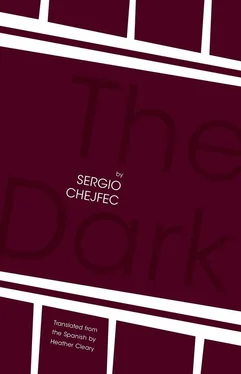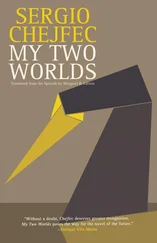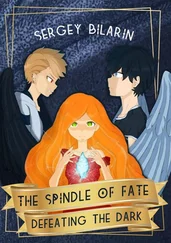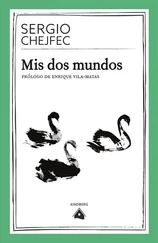As we made our way back, Delia told me a few things about her friend, specifically the details of what had happened on that legendary train ride. She described the monotony of its route; it had seemed like a journey into the depths that, as such, would never end. Delia told stories as though nothing in the world could distract her. She said that the man, seeing the girl’s confusion, took a second portrait from his pocket, showed her that they were identical, and gave it to her. Before he left, he tousled her hair paternally. Delia’s friend would spend the years that followed contemplating her double. The longer she spent with the image tucked among her clothes, the more at one with it she felt. Talisman, key, salvation. She set the portrait in the upper corner of her mirror and would draw near; wide-eyed, she searched for differences, eager to discover something that had gone unnoticed until that moment. The sessions were exhausting: the friend derived a deferred, circumspect pleasure from studying one face and then the other. Time passed, and she had little to show for it. She began asking herself, more and more frequently: How can one find something intangible? Accustomed to the workings of the mirror, reflection and portrait seemed the same to her, to the extent that, had her features not been identical to the model’s, the habit of looking at them would have eventually made them seem so anyway. That is, the prevalence of ambiguity made difference and novelty impossible. Days passed, then months. In her cryptic manner, after a taxing but revelatory session, one day Delia’s friend had a premonition: “From now on, finding something will never mean finding something new.” It would be the other way around, she thought: discovering something old, something that had always been there, but had never been seen. This feeling of connection and frustration was the bond that joined her to the image. As Delia spoke, the path disappeared beneath our feet. Although we couldn’t see it, the ground made itself known through its unevenness, catching us by surprise and making us stumble. The pitch-black night grew denser toward the edges of the street, where clumps of bushes, abandoned objects, and motionless animals attracted us with the pulse of their presence the way the current draws a swimmer off course. This blackness, which seemed strange and probably hostile, was precisely the opposite to us: it reminded us of the blackness of the Barrens. The dark, a stimulus that promised something intimate, untamed. Every now and then we’d see a flicker in the distance: someone carrying a light. Other times, a solitary streetlamp would illuminate the air, which was absolutely still except for the insects or birds that would pass through its cone of light. A common expression might give a sense of these little wells of darkness: a black hole. There were many of these black holes or, rather, the landscape itself was a vast, insatiable one. There, in the realm of the concealed, everything seemed lost and nameless. I’ve read many novels in which the dark is an inverted reflection of light. This was not the case here. If there is beauty in the world, Delia and I thought, if something moves us to the point we are unable to breathe; if something presses our recollections to the very limits of memory, so they can never be as they were, that something lives in darkness and only rarely makes itself known.
As I said, when Delia told a story she grew even more distant from her surroundings; she’d get so immersed in what she was saying that she couldn’t be torn from her thoughts. Something might interrupt her, anything, but Delia would immediately pick up where she left off, more insistent and engrossed than before the distraction. This was not stubbornness, but rather a unique form of persistence; one more trait I have since been unable to find in anyone other than her. As soon as she left it in the hands of her friend, Delia forgot about the skirt. An article of clothing traveled from person to person, place to place, sometimes worn — in Delia’s case, in the ideal way — other times inside packages or bags, wrapped in paper, folded or rolled up in purses or backpacks. An untethered object exposed to the elements that, contrary to what might be expected, was not reduced by its circulation, but rather acquired greater meaning and renown because of it. No one cared who owned the skirt; this followed from a certain truth, which is that no one did. Its mandate was simply that it be returned. This may seem emblematic or symbolic of something else and, basically, it is; but it’s also true that this was how it happened in real life.
As we felt our way along in the dark of the neighborhood, we were covered by the starry night sky. The heavens were so flecked and the earth so black that it felt as though we were at the bottom of a cosmic well. I thought of Delia’s friend within the simple walls of her home and convinced myself that, in her way, she was still guiding our steps. At one point, I remember, some drawings left scattered on the sheets had caught my eye. I leaned in to get a better look and Delia’s friend made a gesture of irritation; she tried to hurry over to hide them from me, and was embarrassed to find that she was too late. I examined them. More than figures, the drawings represented movement; for example, the movement of a hand rubbing across paper on a dirt floor. I don’t know why, after showing me so many things, the lady of the house would rather I didn’t see these pictures. The first thing that struck me was that, if the marks depicted anything, it was largely the processes that produced them. Some of the images were faint, others less so, and their texture was varied or consistent depending on what they had been pressed against; others were delicate, a single upward stroke: perhaps someone had rejected the instrument — the ground in general — and held the paper up to the edge of a stone… I thought that the precise and extravagant surfaces were trying to say something, but that they were employing a language, a form, unknown to me. And because of this they remained mute, at first glance, like Delia’s friend. I imagined the children and adults of the household occasionally spending time tracing its surfaces, choosing a patch of ground and making a print of the pressure they exerted on the earth. The paper, a few pages carelessly torn from a school notebook, would remain as records of a certain time, a relatively limited one, considering the duration of the world. But in their simplicity, which translated into a sort of eloquence, they seemed immortalized as the symbol or incantation of something that, though it hadn’t happened yet, already manifested itself as evidence of what was to come. Perhaps I’ll return to these tracings later on. Anyway, as I was saying, on those walks through the outlying neighborhoods I confirmed that nature holds greater sway in the dark, just as beauty does. If we employed all our senses, we could hear the crackle of ants marching across the ground, the same way the smell of food, though faint, indicated what was being cooked inside the invisible houses. I don’t know. What I mean is that we were humbled by those nights: in the face of such immensity, anything we might do would simply be a consolation or an illusion.
I don’t know. I’m standing in front of the mirror now, in silence. One can search for a sign, just as Delia’s friend did for hours on end, then find it one afternoon and not understand how it could have remained hidden for so long. I remember the day I happened upon the low mirror. That’s all this place needed to feel like a hotel, I had thought. That morning I had woken up with Delia on my mind, probably a thought that had been dragged over from sleep. I hadn’t even opened my eyes yet and, as always, I was already entertaining some trivial idea. I thought: it must be morning for Delia, too. That was all, there wasn’t much more to it. That sort of banality was enough to create the illusion of a routine. As I walked to the bathroom, I listed Delia’s possible activities: waking up early, having a bite to eat, thinking about the factory and about the child, and so on. By then, I knew nothing of her life, and yet it was her, the memory of her, that rescued me every morning from complete indifference. That day, then, temporarily spared from the swirling waters into which I would sink when evening came, I went into the bathroom, stood before the mirror, and was surprised not to see my face. Reality had shifted, and no one had noticed. For a moment, an absurd idea came over me: I was afraid that the bathroom had moved. The mirror reflected a stomach, serious and expressionless. It was my bulbous abdomen, in appearance not unlike a barrel: swollen and stout, dense with skin and hair. And I had to acknowledge that, though startling, reality had been fair in its dealings, that the mirror’s new position was not a threat, just a warning, obviously from the past. I thought, immediately, how thoughts of the future have been abandoned, how everything is a struggle over what has happened, or what no longer does. I thought of the child, who would one day contemplate his own round belly, a belly not unlike this one that had pressed against Delia’s with the unexpected, though predictable, effect of conceiving him.
Читать дальше












